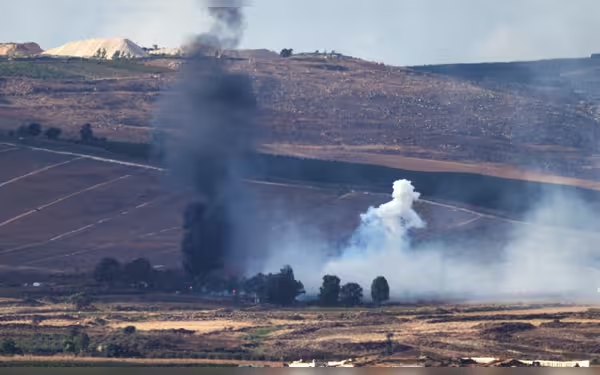Saturday, November 16, 2024 05:59 PM
Israel Expands Military Operations to Lebanon Targeting Hezbollah
- Israel targets Hezbollah, shifting focus from Hamas.
- Humanitarian crisis escalates along the northern border.
- US seeks to revive ceasefire discussions amid ongoing conflict.
 Image Credits: brecorder
Image Credits: brecorderIsrael broadens military focus to Hezbollah in Lebanon, escalating humanitarian crisis amid ongoing conflict and US ceasefire efforts.
In a significant escalation of its military objectives, Israel has broadened the scope of its ongoing conflict, now targeting Hezbollah along its northern border with Lebanon. This development marks a shift from Israel's nearly year-long focus on Hamas in Gaza, which began after the October 7 attacks that resulted in the deaths of over 1,200 people, primarily civilians. The announcement coincides with the anticipated return of US Secretary of State Antony Blinken to the region, who aims to revive stalled ceasefire discussions regarding the Israel-Hamas war.
Until this point, Israel's primary goals were to dismantle Hamas and secure the release of hostages taken during the initial attacks. However, the persistent exchanges of fire between Israeli forces and Hezbollah have led to a humanitarian crisis, displacing tens of thousands of individuals on both sides of the border. In a statement released early Tuesday, Israeli Prime Minister Benjamin Netanyahu's office confirmed that the political-security cabinet had updated the war's objectives to include the safe return of residents in northern Israel to their homes.
Despite not being formally declared a war, the ongoing skirmishes have resulted in significant casualties, with hundreds of fighters killed in Lebanon and dozens of civilians and soldiers on the Israeli side. Israeli Defence Minister Yoav Gallant emphasized that “military action” remains the “only way left to ensure the return of Israel’s northern communities.” Hezbollah, which is supported by Iran, has claimed responsibility for multiple attacks on Israeli positions, further complicating the situation.
On Tuesday, an Israeli airstrike reportedly killed three individuals in Lebanon, whom Israel identified as Hezbollah members. Gallant expressed concerns about the diminishing prospects for a peaceful resolution, stating, “The possibility for an agreement is running out as Hezbollah continues to tie itself to Hamas.” Netanyahu echoed this sentiment, indicating a desire for a “fundamental change” in the security dynamics along Israel’s northern border.
Hezbollah's deputy chief, Naim Qassem, has stated that while his group does not intend to escalate into full-scale war, significant losses would occur on both sides if conflict intensifies. Analysts suggest that Israel's expansion of military operations aims to establish a “buffer zone” in southern Lebanon, a strategy that could further entrench the conflict.
Meanwhile, Hamas has signaled its readiness for prolonged conflict, with its leader Yahya Sinwar asserting that the group is prepared for a “long war of attrition.” Sinwar's message to allies in Yemen emphasized a united front against Israel, stating, “Our combined efforts with you… will break this enemy and inflict defeat on it.”
Despite ongoing negotiations, a ceasefire remains elusive. The United States continues to advocate for a resolution that addresses the humanitarian crisis in Gaza while ensuring the release of hostages. State Department spokesman Matthew Miller noted that Washington is working “expeditiously” on a new proposal to bridge the gaps in negotiations.
As the conflict continues, the toll on civilians is staggering. According to reports, Israel's military response has resulted in over 41,000 deaths in Gaza, a figure that underscores the devastating impact of the ongoing violence. In a poignant reflection of the human cost, a Gazan woman lamented, “This war has left nothing untouched and has killed everything in us, our mental and physical health, our social fabric, our future and our dreams.”
As the international community watches closely, the situation remains precarious. The United Nations is set to debate a draft resolution calling for an end to the Israeli occupation of Palestinian territories, although such resolutions are non-binding. The complexities of the conflict, coupled with the humanitarian crisis, highlight the urgent need for a comprehensive and lasting solution that prioritizes peace and stability in the region.













